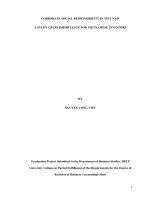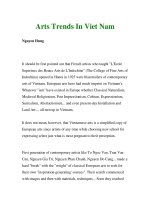LABOR MARKET TRENDS IN VIET NAM
Bạn đang xem bản rút gọn của tài liệu. Xem và tải ngay bản đầy đủ của tài liệu tại đây (30.37 KB, 2 trang )
LABOR MARKET TRENDS IN VIET NAM
-Labor market is the sphere in which labor is “bought” and “sold”, and in which market concepts
such as supply, demand and price operate with regard to human resources.
-Growth in GDP: From 2005 to 2016, there was a fluctuation in the GDP in Vietnam. In detailed,
in 2005, the GDP was 7.5 and declined gradually to 7.0 in 2006. The GDP in Vietnam
experienced a significant decrease in the 2008, it was 5.7, more than 20% decrease from the
previous year. After two years of continuous decrease, this figure rose quickly from 5.4 to 6.4 in
2010, then reduced back in the next two years. There was a positive change in the GDP in
Vietnam during three years from 2013 to 2015, it grew significantly from to 6.7 in 2015.
However, this figure in Vietnam declined moderately to 6.2 in 2017, a decrease of 7.01%.
Overall, the GDP in Vietnam is not stable, increase and decrease frequently.
-Unemployment levels in Vietnam: Overall, the unemployment rate in Vietnam tends to decrease
over the years from 2005 to 2016. In 2005, the unemployment percentage was 5.3%. This rate
declined to 4.6% in 2006 and nearly unchanged until 2009. In 2010, there was a considerable
decrease in the unemployment percentage, it was 3.6%, and continued to go down to 3.2% in
2011. However, this proportion rose back to 3.6% in 2013, then reduced continuously during the
next three years. It was 3.4% in 2014 and remained the same until 2015, and dropped slightly to
3,2% in 2016.
-Population by age group in Vietnam: Population in Vietnam is illustrated by the age group bar
chart and Geographical Distribution pie chart. It is clearly that, the majority of Vietnam
population from middle age (15 -64) made up more than two-third of total in 2015. In contrast,
the smallest rate had shown on the bar chart of age group is the elderly (65 above). On the other
hand, the geographical distribution shown that the people who live in rural still have the most
proportion (66,3% compare to 33,7%) in 2015
-Age Distribution in Vietnam: The table illustrates The Proportion Age distribution in Vietnam In
age of under 15 to more than 65 in 5 years 1989, 1999,2009,2014 and 2015. Overall, the majority
of people from middle age (15-64) made up more than half of the total in 5 years. In contrast, the
lowest rate that could be seen in the category of distribution age is the elderly (65 above).
Percentage of population in 15-64 in Vietnam accounted for the most of total and starting at
56.1% in 1989 then increased during 3 years about 61.1%, 69.1%, 69.4% respectively. On the
other hand, the lowest distribution in Vietnam at age of more than 65 which made up under 8%.
In 2015 population distribution comprised most on this year at just 7.6% which is around double
that of in 1989. The children under 15 in vietnam placed almost in 1989 and 1999 at 39.2% and
33.1% and decreased slightly to 24.5%, 23.5% at 2009,2014. But there was a negligible increase
in 2015 by 0.5% from the previous year.
-Educational Demographics in Viet Nam: The percentage of labor force in the group age of 1519 is 4,3%. Then, this figure steeply increased in group of 20-24 and 25-29 about 10,4% and
11,6% respectively. Continuously, 12.5% belong to group age of 30-34, and it also highest figure
over the group age. From the age group of 35-39 to 60-64 gradually decreases and the proportion
is equal to the original age group of 4.3% (include: 11,9% of 35-39group, 11,8% of group 40-44,
11,0% of group 45-49, 9,95 of group 50-54, 7,7% of group 55-59, 4,6% of group 60-64. There
are 6 age groups cutting the labor rate above 10% and 5 age groups with the labor rate below
10%. Besides, the total labor force is 54.5 million, the highest proportion is the no qualification
group (79,4%). University and above stand behind and also accounting for (9.1%). Professional
college (2,7%), professional secondary school (3,9%) and vocational training (4,9%), these are
all factors that capture a small workforce that can support the labor market.
-Vietnam Workforce Training: The line graph illustrates the percentage of trained employed
workers of working age in 5 years 2010, 2011, 2012, 2013, 2014 and 2015. Overall, the
proportion of trained workers in working age during the period 5 years increased continuously.
In 2010, the proportion of trained employed workers of working age accounted for 15.3%, then
increased in the following years to 16.3%, 17.6%, 19.1%, 19.6% respectively and reaching a
peak of 21.4% in 2015.
-Balance between education and employment in Vietnam: The facts of is 63% fresh graduates
unable to land jobs after graduation. 81% companies hired fresh graduates do the jobs that are
not related to their majors. 3% Enterprises are claimed to have cooperated with educational
institutions. Today, there are more and more companies working in the field of employment.
They are the bridge between the company and the workers. They help workers solve
unemployment. They help businesses solve the problem of lack of human resources. For
example, Vietnam work is set up in October 15,2018 and the one of these companies about job
growth in Vietnam. 91% company hired graduates need training to conduct their jobs. Because
most student just learn knowledge in university but they do not practice this . Moreover, just
30% students attend social activities (best way to get soft skills in Vietnam) at university, in
compare with 85% in developed countries.









